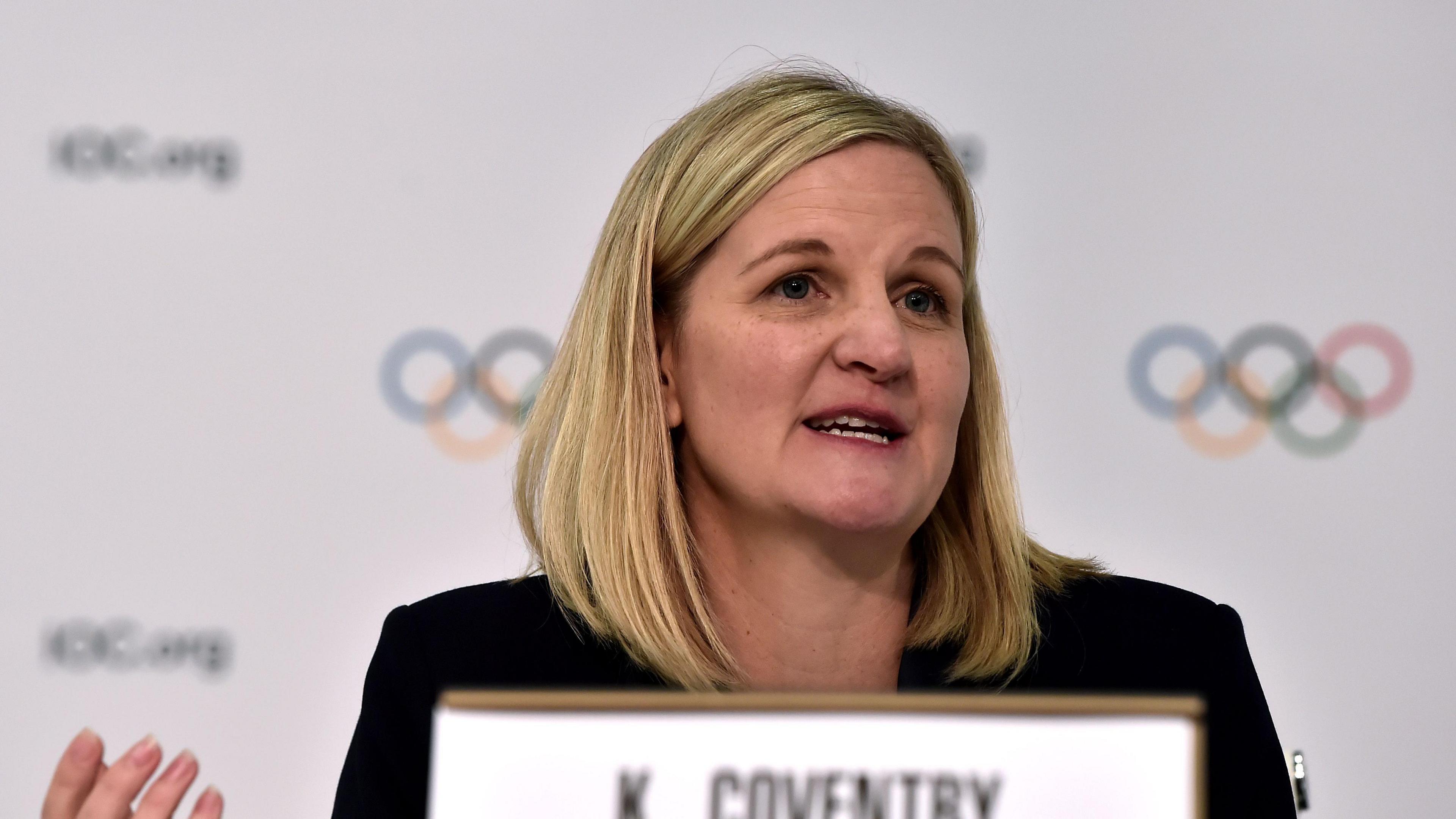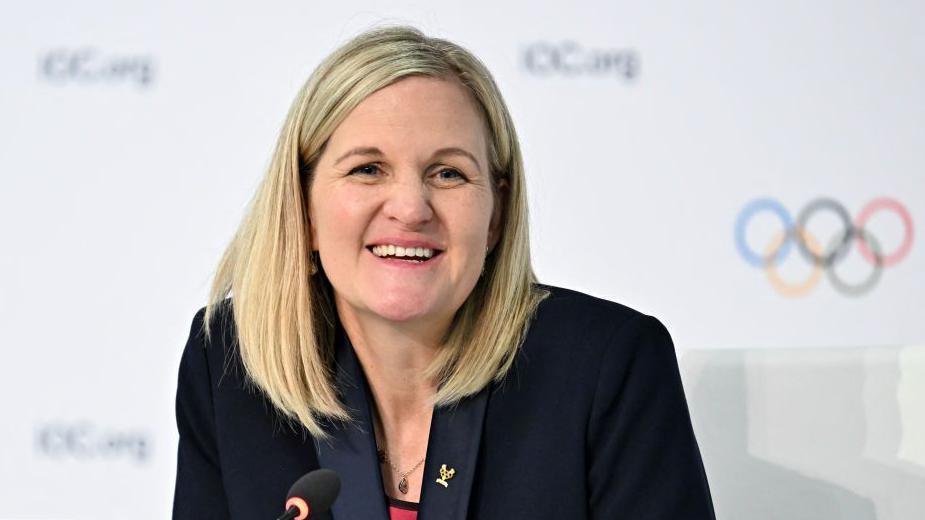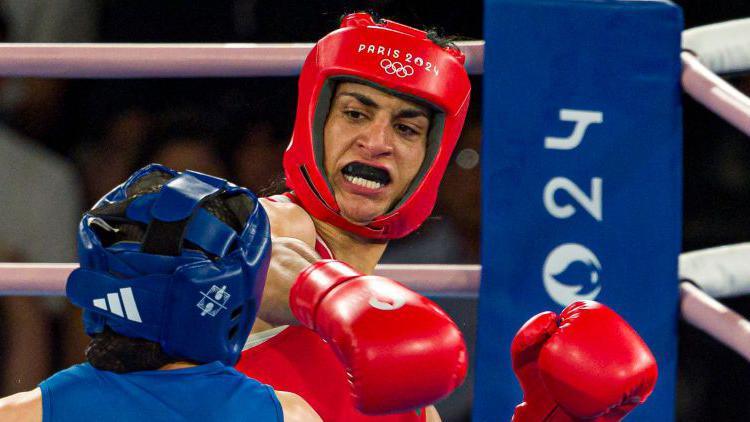We have to protect the female category - IOC's Coventry

Kirsty Coventry was elected as the IOC's first female president in March
- Published
Kirsty Coventry, the new president of the International Olympic Committee, says its members have shown "overwhelming support" to protecting the female category in sport.
In a significant shift in policy, she said the IOC must "play a leading role" in discussions on gender eligibility.
At her first news conference since taking over the role earlier this week, the Zimbabwean revealed a working group on the issue made up of experts and international federations would "ensure that we find consensus".
The IOC has previously left gender regulations to the governing bodies of individual sports rather than applying a universal approach.
But having become the first woman to hold the IOC presidency, 41 year-old Coventry said its members now wanted to develop a policy "to come up with cohesion".
However, Coventry also hinted that no retrospective action would be taken over the controversial boxing tournament at last year's Paris Olympics, when the IOC's handling of gender rules came under intense scrutiny.
Following a first meeting of her executive board, Coventry added, "We understand that there'll be differences depending on the sport… but it was very clear from the members that we have to protect the female category, first and foremost to ensure fairness.
"But we need to do that with a scientific approach and the inclusion of the international federations who have already done a lot of work in this area."
During her election campaign, former swimmer Coventry – a seven-time Olympic medalist - pledged to introduce a blanket ban on transgender women competing in female Olympic competition.
In recent years a growing number of sports federations have barred athletes who have undergone male puberty from competing in elite female competition amid concerns over fairness and safety.
However, in other sports, transgender women are still able to compete in women's events at the Olympics.
The IOC was engulfed in controversy at the Paris Games last summer when Algeria's Imane Khelif won the women's welterweight boxing gold medal - a year after being disqualified from the World Championships for reportedly failing a gender eligibility test.
The IOC cleared the 25-year-old to compete - along with Taiwan's Lin Yu-ting - who was also banned by the suspended International Boxing Association (IBA). The IOC said competitors were eligible for the women's division if their passports said they were female.
Both fighters insist they are women, have always competed in the women's division, and there is no suggestion they are transgender.
Some reports took the IBA stating that Khelif has XY chromosomes to speculate that the fighter might have differences of sexual development (DSD), like runner Caster Semenya. However, the BBC has not been able to confirm whether this is or is not the case.
Last year, the World Boxing Organisation (WBO) said reports it had stripped Khelif of the Paris gold medal for failing gender eligibility tests were "obviously false".
When asked if her working group could apply any retrospective action, Coventry said, "We're not going to be doing anything retrospectively. We're going to be looking forward. From the members [it] was 'what are we learning from the past, and how are we going to leverage that and move that forward to the future?'"
Earlier this month, World Boxing said mandatory sex testing would be introduced in July "to ensure the safety of all participants and deliver a competitive level playing field for men and women." It follows World Athletics which has also approved the introduction of a swab test to determine if an athlete is biologically female.
When asked if she endorsed such a policy, and if the IOC could also adopt it, Coventry said, "It's too early to pre-empt the medical experts.
"It was very clear from the membership the discussion around this has to be done with medical and scientific research at the core, so we are looking at the facts and the nuances and the inclusion of the international federations that have done so much of this work…having a seat at table and sharing with us because every sport is different.
"But it was pretty much unanimously felt that the IOC should take a leading role in bringing everyone together to try and find a broad consensus."
In response, World Athletics president Lord Coe - a rival of Coventry in the IOC presidential election earlier this year - posted on social media: "Fully support this strong position, it is essential for the future of women's sport.
"World Athletics has offered its advice and experience based on over 15 years of detailed science, research and actions in protecting female sport."
In February, the president of the International Paralympic Committee told BBC Sport that he is opposed to "blanket solutions" for transgender participation policies.
Andrew Parsons was speaking after United States president Donald Trump signed an executive order that prevents transgender women from competing in female categories of sports. He said he would deny visas to transgender athletes seeking to compete in female categories at the Los Angeles Olympic Games in 2028.
Coventry said the IOC also planned to set up a second working group looking at when Olympic host cities should be named.
Related topics
- Published21 March

- Published30 May
